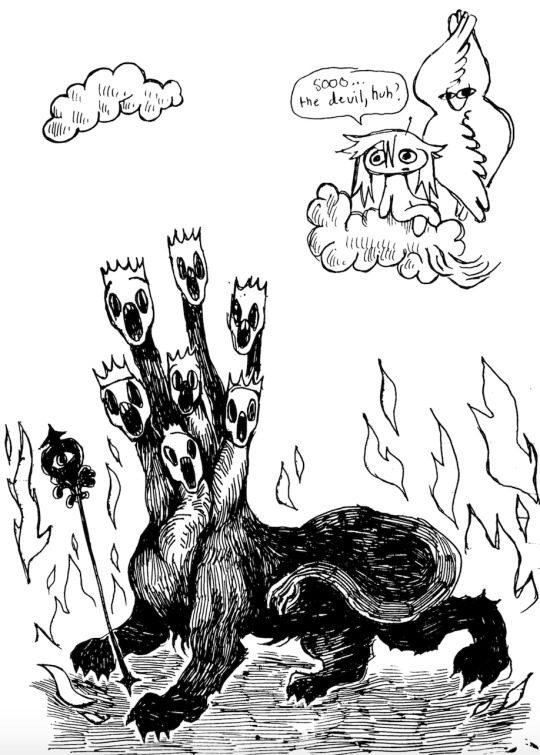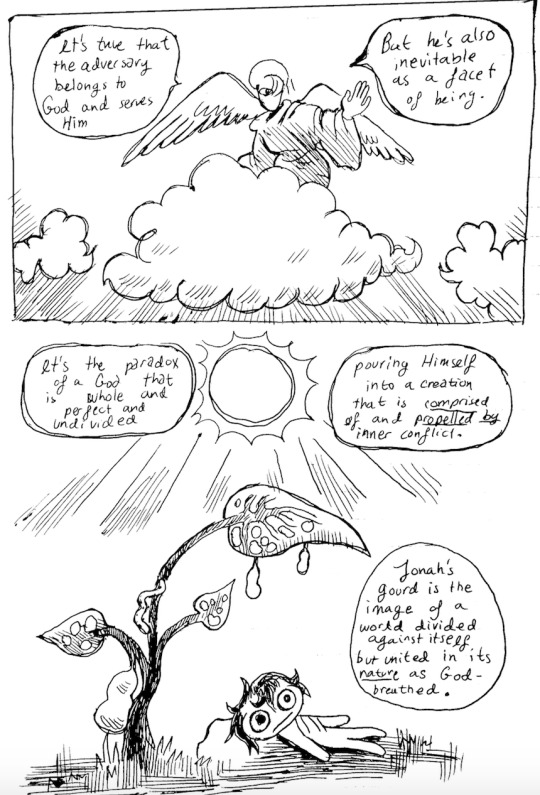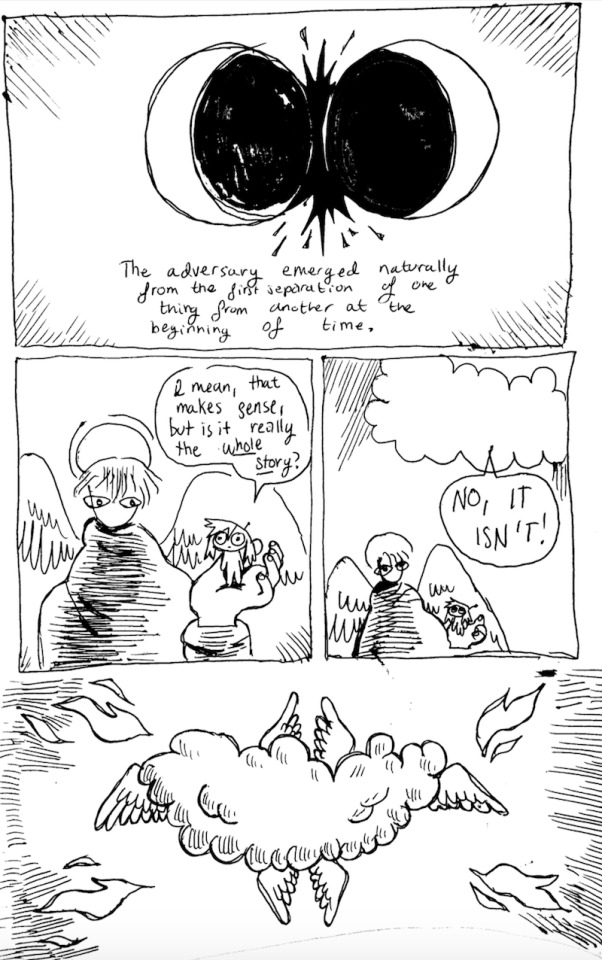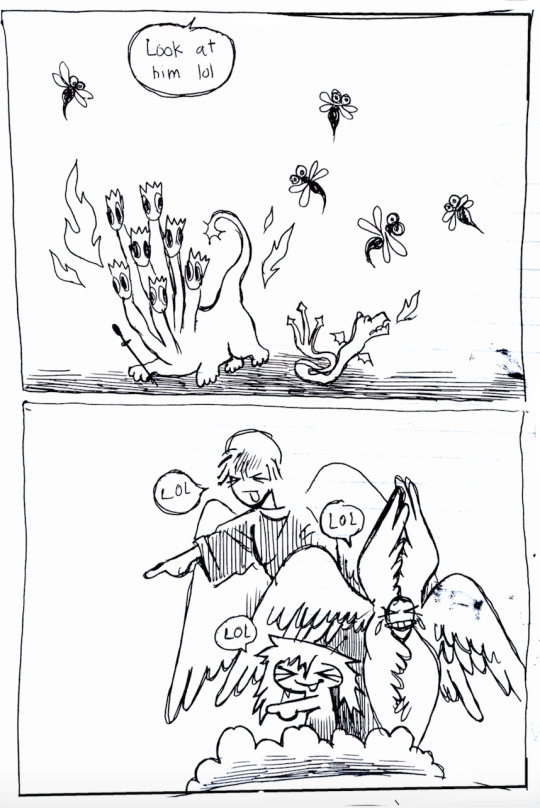#theodicy
Text
For what it means is this, among other things: that for whatever reason God chose to make man as he is—limited and suffering and subject to sorrows and death—he had the honesty and courage to take his own medicine. Whatever game he is playing with his creation, he has kept his own rules and played fair. He can exact nothing from man that he has not exacted from himself. He has himself gone through the whole of human experience, from the trivial irritations of family life and the cramping restrictions of hard work and lack of money to the worst horrors of pain and humiliation, defeat, despair, and death. When he was a man, he played the man. He was born in poverty and died in disgrace and thought it well worthwhile.
Dorothy Sayers on the Incarnation, "The Greatest Drama Ever Staged" (emphasis mine)
#the HONESTY and COURAGE#i encountered this quote in a Keller sermon i was listening to at work so naturally i had to read the whole essay when i made it home#excellent wonderful stuff#pontifications and creations#unto us a child is born#theodicy#be strong and courageous
488 notes
·
View notes
Note
how do you keep your faith even while such horrific things are going on in palestine? i've been a christian all my life and i understand that the question of why god allows suffering is one that people have always been asking, that we can never really know the answer to, but it's just so hard for me to see things like this, all of these innocent people being terrorized and murdered in such evil ways, and understand why god can't stop it from happening. in church we pray for both israel and palestine and it feels so pointless, and just makes me frustrated that i can't actually do anything to stop this. especially knowing that even bethlehem, the place of jesus's birth and home to many palestinian christians, is being attacked and churches are being bombed. it seems pretty clear that the people committing these atrocities are never going to open their hearts and stop, and the world leaders who would have the power to make them stop either don't care or directly support them. i do not want to believe that god doesn't exist, or that god would just sit by and watch all of this happen if it were possible to stop it, but it's such a struggle at times like this. i feel like it shouldn't be and like i should've had this figured out by now. it's okay if you don't answer this, i just love your blog and have learned a lot from it over the years, and am incredibly saddened by the state of the world right now.
Hey there, anon. I feel with you and stand with you in your struggle. I also gently suggest you work on letting go of the sense that you "should" have this figured out by now. Firstly because learning to release myself from "shoulds" is something my therapist taught me and it's been super helpful for showing myself love; secondly because I believe it is deeply, deeply faithful to ask these questions, to demand to know where God is in the face of evil — not just once, but continuously across our lives.
If at any point we think we have it "all figured out," if we think we've reached a fully satisfying solution to the problem of how a good God could "let" evil things happen, we're more likely to be numbed by fatalism or become complacent in the face of injustice. As Rabbi Jonathan Sacks (may his memory be a blessing) put it when asked why God lets bad things happen to good people,
“God does not want us to understand, because if we ever understood, we would be forced to accept that bad things happen to good people, and God does not want us to accept those bad things. He wants us not to understand, so that we will fight against the bad and the injustices of this world, and that is why there is no answer to that question.”
Ask the questions. Bring all that you feel — your grief, your confusion, your frustration, your doubt, your fear — to God. Study and pray and converse with others.
And while you're doing all that, and accepting that it'll be a lifelong exploration, act.
Let your love, your words, your actions be the divine response to injustice — because for whatever mysterious reason, God chooses to act through us, through all who follow Their call to "do justice, love kindness, and walk humbly" (Micah 6:8).
___
So yeah, I can't tell you why God doesn't just jump in and stop the evil, why God seems to limit Their own power to intervene (or even to lack that power to begin with), why God respects our free will even when we misuse it to such great harm (though you can see the bottom of this post for places to explore all those questions).
But I can tell you where I believe God is in the midst of all the questions, all the loss, all the suffering — and that's not on some lofty throne indifferently observing our pain; God is right there in the midst of that pain.
Where is God in the face of hate, violence, death? God is co-suffering with us, shouldering the burden with us.
In Exodus 3:7, God says They don't only see the enslaved Hebrews' misery, don't only hear their cries, but that They know the people's suffering — an intimate knowing, as of one who experiences it themself.
In Matthew 25, Jesus tells us that when humanity fails to welcome the stranger, visit the prisoner, feed the hungry, clothe the naked, comfort the oppressed, we fail to do those things for him — for he identifies so intimately with all whom the world calls "least" that he is one with each and every one of them.
So I don't know why God doesn't just fix everything, dammit! — it's the first question I'll be asking Xir when I die, because wtf!!
But I do believe, and I do draw some comfort knowing, that God does not leave us to suffer alone. God is one with the oppressed; God shows ultimate solidarity to the oppressed; and God acts with each of us who act for and with and as the oppressed.
And the good news in the midst in this horror is that there are things that all of us can be doing to act in solidarity with the oppressed!
Our efforts truly are making a difference. Politicians and whole governments across the globe have been startled by the resistance to pro-Israeli propaganda and solidarity with Palestine. The change is slow, but our protests are making an impact. Palestinians have been asking that we keep protesting, boycotting, educating, spreading the word. Because it is helping, slowly but surely.
As long as Palestinians refuse to give in to despair, we too must continue to fight. Palestine will be free. We will not stand silent as genocide occurs.
Boycott as many of the companies named by BDS as you can. Notice that they're focusing on a narrower, more targeted group of companies than some of the enormous lists people keep sharing — that's to help us avoid becoming overwhelmed! So boycott what you can from their list; these are the companies directly contributing to Israel's violence. And spread their list to anyone you can.
If you live in a country with a government that has yet to join the call for a ceasefire — and especially if you, like me here in the US, live in a country that is actively funding/otherwise supporting Israel's violence — call or email your representatives to demand a ceasefire.
Resistbot can help make that easy, in the US at least.
Educate yourself about the history of Palestine and Israel. It's important so that you can recognize lies and propaganda, and also so you can speak knowledgeably about the issue with others. It's also important because understanding and simply bearing witness are two big things Palestinians ask of us. You don't need to know everything, but know enough to bear witness, to remember the loss, and to debunk bullshit when you see it.
Here are some places you can get educated — link to free ebooks; article on current events; article with current perspectives from Gaza; and I've been reblogging news & resources as I see them over on @a-queer-seminarian
Post about what Gaza is going through on social media!! Don't let the fight die down! Talk about it with friends or others you think might be swayed to join the fight if they had the information that most media stations are failing to report on.
Stand up against Islamophobia in all forms.
Stand up against antisemitism in all forms. As Christians, this includes recognizing and uprooting supersessionism in our biblical interpretation, our liturgy, our hymns, etc. It also means learning about Christian Zionism.
One of Israel's primary arguments for the "necessity" of its oppression of Palestine is that Israel is necessary because nowhere else on earth is safe for Jews. They're right that nowhere else is safe for Jews; but they're wrong that Israel is safe for Jews — an settler-colonialist state, a war zone, a state that requires every civilian to serve some time in the military, is not safe for Jews either. But as long as they can point to the antisemitism rampant across the globe, they can use that as an argument. So to counter Israel, and much more importantly to stand in solidarity with Jewish people across the world, don't let antisemitism go unchecked.
Join in protests in your area. Follow Jewish Voices for Peace or Jews Against White Supremacy for info on such events.
Link to places to offer fin.ancial support
Want more ways to act? Check out https://www.palestineaction.org/
___
There is no easy answer to the question of suffering — but even so, it can be helpful to explore it deeper, to examine what conclusions others have drawn over the eras. If you want some resources for your wrestling, here are some:
This post goes into the basics of theodicy, the "the intellectual effort to jerry-rig three mutually exclusive terms into harmony: divine power, goodness, and the experiences of evil"
Then there's my #theodicy tag where I put all posts / links about this issue
I also have a long-ass YouTube video diving deep into "the problem of suffering"!
___
I hope this response brings you comfort and courage, friend. Don't be afraid of questions, of grief, of concern — let them galvanize you for the struggle. Solidarity forever <3
72 notes
·
View notes
Text
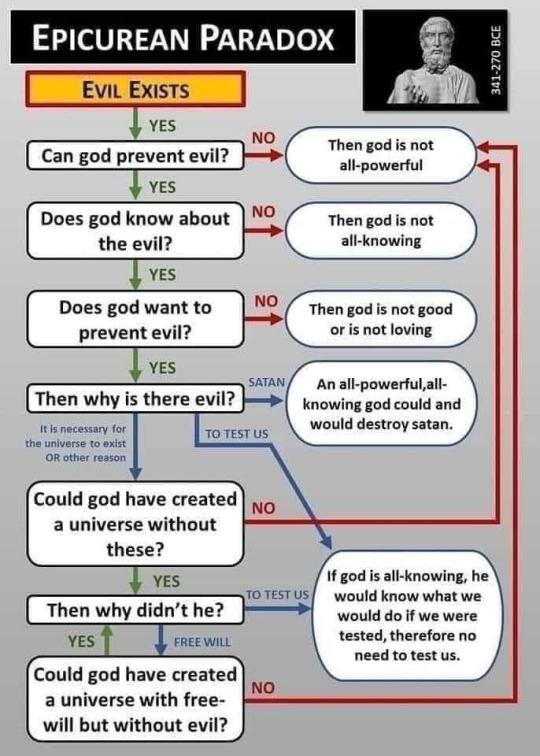
https://en.wikipedia.org/wiki/Epicurus#Epicurean_paradox
"Is God willing to prevent evil, but not able? Then he is not omnipotent. Is he able, but not willing? Then he is malevolent. Is he both able and willing? Then from whence comes evil?"
https://en.wikipedia.org/wiki/Theodicy#Reasons_for_theodicy
Theodicies are developed to answer the question of why a good God permits the manifestation of evil, thus resolving the issue of the problem of evil.
In science, when an idea is falsified, it's either thrown out, or withdrawn and revised. In theology, you invent an entire bogus domain to pretend it's still true. Theodicy is that domain. The entire reason it exists at all is because the Problem of Evil shows the god claim doesn't work, but they won't admit it.
Isaiah 45:7
I form the light, and create darkness: I make peace, and create evil: I the Lord do all these things.
#Epicurean paradox#Epicurus#problem of evil#theodicy#religion#free will#evil#religion is a mental illness
168 notes
·
View notes
Text
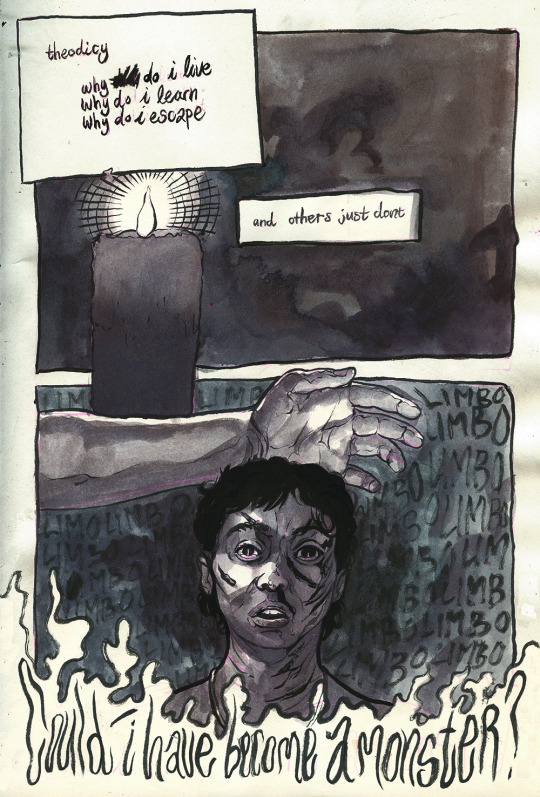
'talk to me' hurt very bad
gotta figure it out somehow
so have this comic
61 notes
·
View notes
Text
The Suffering God
In all religions, a question mark has been set against the omnipotent and serene gods by the sufferings of men. But only in Christ does the concept of a suffering God appear. […] Only in Christ does it become clear that we can put God to death because he has put himself in our hands. Only since Christ has God become dependent on us. Christ did not identify himself with a calm spectator of all our troubles. Christ, by his teaching, life, and death, made plain the helplessness of God in the world; the suffering of unrequited and unsuccessful love.
[...]
That God in the world has been, and still is, mocked and tortured, burnt and gassed: that is the rock of the Christian faith which rests all its hope on God attaining his identity. This pain is inextinguishable; this hope can never be taken away. What Christians share in common is 'their participation in the sufferings of God in Christ. That is their faith.' In this faith they know that God is helpless and needs help. […] He put himself at risk, made himself dependent on us, identified himself with the non-identical. From now on, it is high time for us to do something for him.
- Dorothee Soelle (Christ the Representative: An Essay in Theology After the 'Death of God,' pages 151, 151-152). Bolded emphases added.
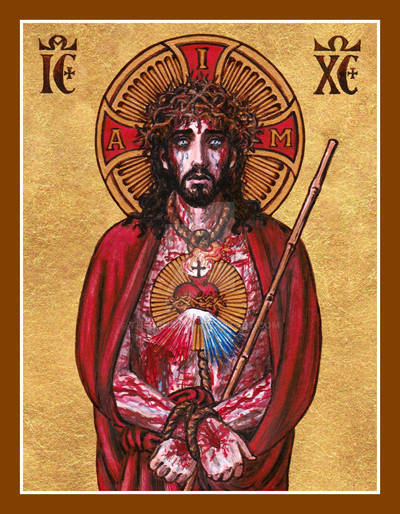
Man of Sorrows, by Theophilia
#Christianity#theodicy#Jesus Christ#Incarnation#vulnerability#compassion#suffering#Sacred Heart#Ecce Homo#Divine Mercy of Jesus#Dorothee Soelle
24 notes
·
View notes
Text
WHY YOUR MORALITY IS MY PROBLEM: modern holdovers from ancient theology
James Dobson, founder of the ultra-conservative Focus on the Family organization, reputedly said of the 2012 Sandy Hook mass shooting, “I think we have turned our back on the Scripture and on God Almighty and I think He has allowed judgment to fall upon us.”
As heartless as that sentiment sounds today when addressing the murder of 20 first-graders (and 6 adults) at an elementary school, it reflects a once-common theology that emerged about four thousand years ago in the ancient near east (ANE*), then bled into the Mediterranean basin and developed an astonishingly long half-life. It’s why some Christians (et al.) are so, so concerned with what their neighbors are doing behind closed doors. Or on their front lawns with all those Pride flags.

In some ways, ANE and Mediterranean religion had a lot in common, being traditional and focused largely on sacrifice/action (orthopraxic). Over time, some orthodoxic religions also arose in that area. So, first, let’s do some quick defining.
Orthopraxic religions focus on what one DOES, not what one believes. Performing the sacrifice correctly, honoring the gods/ancestors appropriately…that’s how one shows piety. Infringing against purity laws or other affronts to the gods (impious actions) can result in expulsion from the community. Fights over correct practice can lead to schism in a community.
Orthodoxic religions focus on what one BELIEVES. Thus, they need some form of authoritative text to determine what IS right belief, resulting in the emergence of a canon (e.g., Zoroastrian Avesta, Jewish Tanakh, Christian New Testament, or Muslim Qur’an). In Orthodoxic religions, wrong beliefs (heresy) can result in expulsion from the community. Fights over correct belief can lead to schism in a community.
(There’s yet a third focus, orthopathic, but that largely doesn’t apply here. “Orthopraxic” can also apply to ethics-based religions, but here, it applies to ritual/cultic behavior.)
Most religions have elements of all three, but it matters where the weight falls. Yes, religions can emphasize two sides of the triangle more heavily, less on the third, but even then, one point will be the chief measurement of devoutness among followers. This also helps us understand why two religions might not understand each other very well sometimes. They’re trying to impose one set of “What religion is for” ideas on another, with entirely different assumptions.
The religions of the ANE and Mediterranean had much in common in terms of the purpose of religion: to maintain the health of a community. This depended on the piety of that communities’ members. Their gods weren’t moral in the modern sense, but could be jealous, fickle, and petty.
Why were they gods then?
Because they were immortal and more powerful.
Yet an important difference between (many) ANE and Mediterranean religions were the concepts of sin and “mesharum” (divine justice/equilibrium). If the latter existed (sorta) in Mediterranean society, “sin” really didn’t. Impiety differs as it can include ritual matters too. So, if murder (especially kin murder) created uncleanness anywhere and is a moral/civil matter, menstruation and sex also created uncleanness, but were not moral/civil matters defined as “bad.” So “unclean” ≠ “sin.”
To be unclean is a matter of cultic purity, different from moral purity. Yes, ANE religions also had ritual uncleanness, to be sure. And yes, some things that make one unclean also have intimations of “badness” without being so extreme as murdering someone. Yet I want to underscore the difference because it’s very real and too often ignored/misunderstood/unfairly conflated.
Many Mediterranean religions did not have “sin,” just unclean and impious. MORAL/ETHICAL matters were dictated by civil law and later, philosophic discussion. Not religion. Yet in the ANE, moral infractions were affronts to mesharum (divine order) and were therefore a religious matter. This oversimplifies, but smash-and-grab works for now. We find actions (like iconoclasm) in the ANE that didn’t often apply in the Mediterranean. (Iconoclasm is the deliberate theft, or in extreme cases, destruction of religious icons or structures.)
Yet what both groups shared was a sense that the gods had, well, “bad aim.” If people in a community were impious and/or sinful, that might draw the ire of the gods. Plagues were often seen as divine retribution for the impiety and/or sin of one or more members of that community, but not necessarily all of them. This led to the exile of impious individuals, as well as the ANE “scapegoat” ritual, et al. (If you’re familiar with the plot of the Iliad, Apollo punished the entire Greek army for the impious actions of Agamemnon.)
I could DIE from your impiety/sin committed in my town/community.
That makes your morality my business.
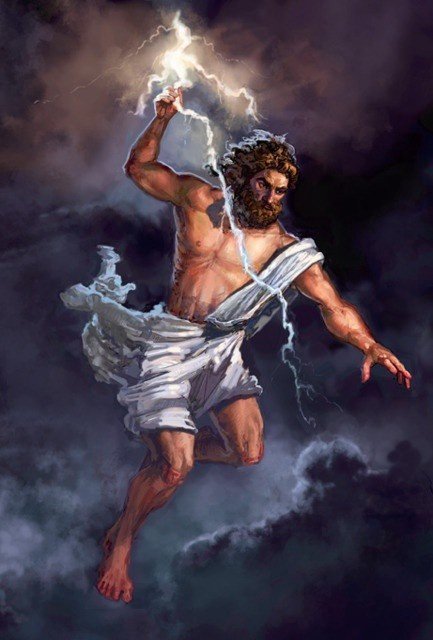
In addition, especially in the ANE, war on earth was believed to reflect war in heaven. Gods had cities and peoples, not the other way around. They chose you, you didn’t god-shop—hence Israel as a “chosen people.” Well, yeah, pretty much every ethnic group was chosen by some god(s). But as a result, if your side lost in a war, then—theoretically—your gods were weaker. Maybe you should go over and start worshiping their gods. Yet that didn’t sit well with most groups, so by the Middle/Late Bronze Age, we see an emerging idea that my god isn’t “weaker” than yours, rather my general “set forth without the gods’ consent,” or my god permitted the other god(s) to win for whatever reason…usually due to sin or a lack of piety among his (or her) people. Of course we find this in the prophetic literature of the Hebrew Bible, but it’s in a lot of other ANE literature too. Nabû or Marduk didn’t lose, they “went to live with” Ashur for however many years—although the winning side will portray the victory as Nabû and Marduk traveling to Nineveh to bow before (e.g., submit to) Assur.
Again, this is simplified, but we don’t see this sort of language used in Greece where Hera would bow to Athena because the city-state of Athens defeated Argos, even if, as promachos (foremost in battle), Athena might be expected to win in any conflict between the two (as in Euripides’ Children of Herakles). Hera is still queen of the gods, and—even more—these are shared deities. We also don’t see it because notions of “sin” don’t apply and only a handful of wars were ever called “sacred”—all of them concerning Delphi and cultic purity. At least one of those is mythical, the second probably didn’t happen, and the third (which certainly did happen) was labeled “sacred” only by one side. Greek gods just weren’t seen to uphold justice in the same way. Roman gods were more concerned with such things, but still not as we find in the ANE.
Ergo, the ANE faced the problem of theodicy: if god/the gods are good/just, why does tragedy happen?
Early explanations for tragedy were simple: those who suffer must have earned their suffering, sometimes referred to as Deuteronomic Theology: “good things happen to good people”/“bad things happen to bad people” (and maybe their neighbors too, by chance).
Pushback against this notion emerged around the same time a more nuanced view of loss in war emerged. People began to ask the corollary: “Why do bad things happen to good people?”
The (c. 1700 BCE) Mesopotamian Ludlul bēl nēmeqi (The Poem of the Righteous Sufferer) attempted an answer. About a thousand years later (600s-500s BCE), the Jewish Book of Job took it on as well. In both, the protagonist asks, “Why does Marduk/Yahweh punish me when I’ve been a faithful servant?” Both protagonists were previously wealthy/powerful, which was seen as divine approval. Losing that wealth/health suggested they had offended their god (and are being punished). Yet each one claims he did not sin—so why?
The answer in both works is similar: there’s not really an answer. Marduk restores Šubši-mašrâ-Šakkan, who ends the poem with a prayer of thanksgiving. Job has a chat with Yahweh, who essentially tells him, “You’re a measly mortal, don’t question me.”
The KEY element in both, however, isn’t the answer, but the assertion that a good person can suffer. They didn’t earn it; it just happened. They remained good and, eventually, their god restored them to their prior station, and then some.
Ergo, if you’re suffering, just be patient. Don’t curse God and die. (As Job is advised to do.)
Today, we may find such an answer wanting but need to recognize it for an advancement on the theology of tragedy.

Some, however, get stuck in these time-locked answers because they can’t allow their religion to grow. Or rather, they can’t acknowledge that their religion/theology evolves over time, because if it evolves, it wasn’t perfect from the beginning. And that challenges their understanding of their god.
Yet the real fly in the ointment is the notion of a perfect and infallible canon.
This brings me back around to what a canon is. It just means “an authoritative text,” but how that text is understood has nuances. INSPIRED ≠ INFALLIBLE. Most all followers of a canonical text believe it’s inspired by God, but not all (or even most) believe it’s infallible. (Islam is its own category here, note.) That creates some problematic GRAYS.
If it’s only inspired, written by humans with human foibles and history-locked understandings, interpreting it becomes complicated and can lead to disagreements. Taking a literalist view sweeps away the messiness. “God said it; I believe it; that settles it!” Black-and-white.
Those who believe in Biblical literalism/inerrancy (which includes a good chunk of conservative Christian Evangelicals and all Fundamentalists**) will argue ALL the Bible is true. If it’s written by God, it must be perfect from the get-go. Thus, a clash is created between simpler versus more nuanced views: Deuteronomy vs. Job. If an earlier view must be as true as any later one, that reduces everything to the most elementary version. It can’t evolve/grow up, yielding what feels to most like a very archaic (and often harsh) worldview.
In any case, both the traditional orthopraxic and orthodoxic religions of the ANE/Med Basin believed God/gods punished people who offended them. AND these punishments might “spill over” onto family and neighbors.
Ancient divine collateral damage.
Ironically, this is WHY early Christians were prosecuted by the pagan (e.g., traditional) Roman and Greek religious establishments. Christian failure to participate in common civic religious cult could earn divine ire. For their first two/two-and-a-half centuries, Christianity was labeled a religio illicta (illegal religion)—in part for “failure to play well with others.” E.g., make sacrifices to the appropriate Greco-Roman deities. Thus, when disaster struck, a scapegoat was sought. Those antisocial Christians are to blame! They don’t sacrifice to the gods and so, offended XXX god, who is now punishing ALL of us with YYY.
Classic ancient religious thinking, but it’s one reason I find current conservative Christian opposition to Teh Gays, trans folks, etc., enormously ironic. The persecuted have become the persecuting.
I want to emphasize that large sub-groups of Jews, Christians, and Muslims have evolved past such theologies. Yet others have not and stubbornly cling to ancient mindsets. That’s why they argue the mere presence of LGBTQI+ people will bring down the wrath of God on ALL.

Talk of “grooming” and “protecting children” is just an attempt to make palatable a belief they know won’t fly with most people, who they consider deluded by The World (e.g., the devil). Trickery is therefore required. As they’re deeply afraid themselves, they understand fear and use it to motivate others. Many are perfectly happy to make their beds with “unbelievers” long enough to get their agendas passed. God will forgive them.
This, too, is rooted in ancient ideas (discussed above) whereby a people’s own god might employ the enemy to punish them (or others). Thus, a sinful person can be utilized on the way to righteous ends because the victory of God wipes away all else. Using the enemy to effect God’s will just proves that God is in final charge of everything after all. It’s the ultimate PWN.
I hope this helps to explain where these ideas come from, how they originally emerged, and why a subgroup of people still cling to them.
————-
* While Egypt influenced the ANE, as well as Greece and Rome, and is often shoehorned into the ANE, I consider Egypt as NE Africa. It deserves to be treated on its own, or in relation to neighbors such as Kush.
** Fundamentalists and Evangelicals tend to be equated but are not the same. Also, not all Evangelicals are conservatives (although all Fundamentalists are, by definition). Enormous variation exists between Christian denominations, which range from ultra-conservative to (surprise!) ultra-liberal. There is as much of a hard Christian Left as there is a hard Christian Right. We just tend to hear far less about them.
#iconoclasm#mesharum#deuteronomic theology#book of job#poem of the righteous sufferer#ancient theology of tragedy#theodicy#ANE theology#ancient Mediterranean theology#Classics#ancient near east#ancient religion
25 notes
·
View notes
Note
Question coming from your 'Athiests are bad at criticizing Christianity' post:
What is the Calvinist theodicy for the Problem of Evil, since you can't use the classic "Love must be given freely to be truly Love" argument?
A couple things
This does vary depending on which Calvinist you ask.
1. It's not that Calvinists believe that the love given to God isn't given freely, it's just that we believe the human will is not inherently autonomous. So, we were designed to love God and the fact that we don't is due to a brokenness in our nature, so in a Lewisian sense (though he wasn't a calvinist lol but I wish he was) we're more genuinely ourselves post-intervention/healing than before. God is fully in charge of whether this happens or not.
2. To your point. My preferred explanation is that it causes God to be glorified for evil to be given a chance to "make its case" as it were to try and prove that it is better than God, and events on Earth will prove God's case, and then he will return to judge evil. God is the only thing that is self-existent, and the only thing that could ever oppose God is a creation of his with a fall or corruption from his perfection&purpose for it. God will prove his superiority over the only thing that could ever oppose him and then the rest of eternity will happen.
To put it another way, God allows evil to exist so that he can have glorious victory over his enemies & put all things under his feet.
"The glory of God" is, according to the catechism, the ultimate reason for the creation of the universe itself and the existence of everything that exists, so I don't think this is too far fetched. (And not accusing anyone here but I think that if this doesn't seem worth it to you, you might have to look into your view of who you think God is.)
Ultimately though God's purpose is at least somewhat a mystery to us, but I believe some aspects of this mystery (like why suffering was allowed in the lives of individuals etc.) will one day be revealed.
43 notes
·
View notes
Text
... great, now I can't stop imagining how Holmes reading out Browner's statement ... Possibly very dramatically in the beginning to amuse Watson, but then becoming more serious with the story's progression until in the end he's like ... well ... what a fucked-up situation. *casually raising the problem of theodicy*
38 notes
·
View notes
Text
“And because I am happy, and dance and sing, they think they have done me no injury.” [Chimney Sweeper]

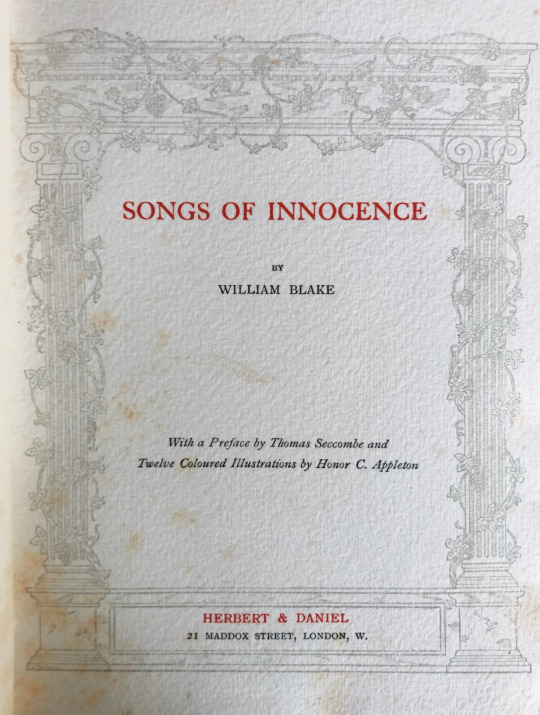


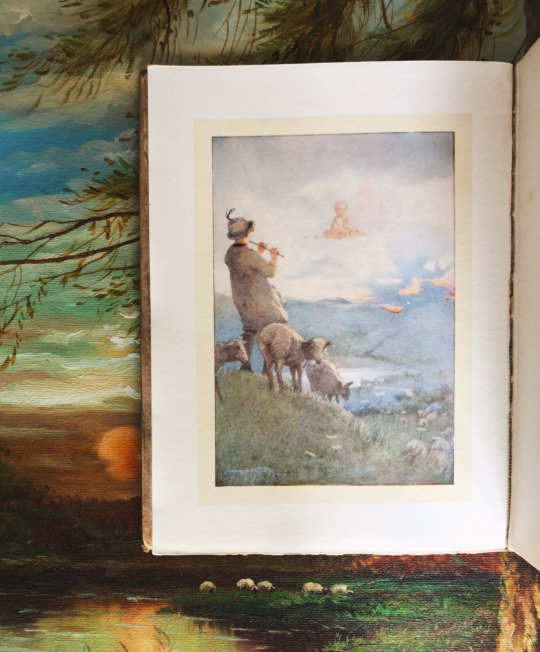



William Blake, a wonderfully exciting poet from the Romantic era, was born in London in 1757 into a working-class family with strong nonconformist religious beliefs.
Blakes believe and symbols are continously intervowen in his art. His poetic genius is trying to liberate the instinctual self and to defeat reason.
Blake's ethics formulates the originator of morality and religion through the process of liberation. Overcoming phenomenal objectness or fragmentation for the sake of a symbiotic unity of humanity within themselves and peaceful harmony of man with the world.
For every soul-wanderer, reading Blake is a spiritual gift and looking at his visualised art, a dive into cosmic seas of collective psychology.
Blake is breaking the lopsided emphasis of idealistic works. In all his gatherings of beauty, there is always a shadow of existential crisis. Even in the following work "Songs of Innocence",
the Fall off Paradise is already happening.
The violation of nature has begotten: The water is no longer clean and clear.
The eternal division of humanity from the divine cosmos as a complex interplay of an individual search for the Holy Grail, is the human idiosyncrasy.
The scepticism against rationalism and science is also playing a key role in Blake's work, as he underlines that only “The road of excess leads to the palace of wisdom.” [The Marriage of Heaven and Hell] and that "Art is the tree of life. Science is the tree of death."

Blake condemned the scientific trio of Isaac Newton, John Locke and Francis Bacon as sterile and materialistic. In this painting, (the idea of) Newton- sits on an algae covered rock, making calculations with a compass, like Urizen in Ancient of Days. He might be at the bottom of the sea, or perhaps in a black hole. He might be as Faust, signed a contract with the devil a few moments ago and then lose oneself in a cave, studying minerals and stones.
“The imagination is not a state: it is the human existence itself.”
The work "Songs of Innocence (and Experience)" is a double set of illustrated poems showing “the Two Contrary States of the Human Soul”, the child-like and pure versus the angry and disillusioned (cf. Jung's psychology and the meanings of symbols and archetypes- The shadow of the child is the senex, vice versa).
Here we also have dualistic concepts of questioning the being and the problem of theodicy: How could God tolerate the "evil" and why are bad things happening at all? If God is "the loving father" why are the humans deprived of their original goodness? Why is our world still torn between ferociousness of the few and the humble benign of the resisting ones?
Through the Fall of Man the unity between man and animal was broken (Gen. 3, 17 - 19), so the seperation is a result of the "evil", which was subsequently brought into the world.
An anthropological interpretation could be, that the "Fall of Man" or the "Original Sin" are narratives that memorize our cognitive faculty. First we had to be aware of ourselves and our environment, than we were able to distinguish between different kind of (living) beings.
The consciousness aroused questions about ethics, examining motives, motivations and shaping a guideline of virtues (Golden Rule).
But throughout the history of generating more insight- of metaphysical speculation and cosmogonic questioning of the creation of the world, it seems difficult to tell what we can really know and what are just guesses.
In modern times (but beginning with Xenophanes) the imago of God is excoriated as anthropomorphic.
But this statement shall not purport, that our human imagination is nothing less than an illusion and so less than nothing.
As Blake wisely interlinks our assumptions with the search for the first principle:
“He who sees the Infinite in all things sees God. He who sees the Ratio only sees himself only. Therefore God becomes as we are, that we may be as he is.”
Poets are the mediator dei, healing the earthly-borns from the abscence of spiritual healing. The humanity got more distrustful torwords ideals and the invisible world, but on the contrary, an individual, who always lacked deep philosophical wondering, is affected and enraptured easily through manipulative groups, who are just imitating religious sentiments, but without soul's salvation.
The search of the humankind is an eternal journey to it's cosmic roots, a balancing act between boon and bane, an entanglement of wisdom and folly: Theia Mania.
“In the universe there are things that are known and things that are unknown, and in between there are doors.”
There are some theories and perspectives dealing with the similarity between holiness and madness, found in all world religions. Mania can be the consequence of confrontation with the absolute and infinite, which is overwhelming the human reason and through overstraining, turning them mad. Mystic mania is one of my favourite motifs, it is the breath of prophecy and the ecstasy of poetizing the world of illusions, as a bridge to eternal ideas.
It is the idea of intensive love (to God and being), a radical self-denial for unification, a call for liberation.
Paradox pairs in Blakes works are continuously expanded,
"Without contraries is no progression. Attraction and repulsion, reason and energy, love and hate, are necessary to human existence."
Blake sets contrasts or he is breaking boundaries, either way he is creating and this energy of creating out of imagination, is considered by Blake as the "only life".
______________________________________________________________
Inspired by Blakes bucolic poetry and hints of a collapsing worlds, I was incited to write a small tribute with the most common motifs of the poetry in "Songs of Innocence".
The Active Evil and Passive Good by Elvin Karda
Dwelling in the arcadia
Pure daisies and cle the joyful life
Piping songs of pleasant glee
A child watches the piper
on a cload
"Pipe a song about a lamb-
Let those tones into the air
A reminiscence of a golden
land
Hidden treasures in ancient
sand!"
The piper plucks a hollow reed
fire tunes his inner song
and he stains the water clear
walking the rippling stream
along
In the evening dew
The joy is giving way to tears
When green shoots turn violet-
blue
Error is created and
eternal what is
true
The child's weeping
as meek as lamb
But vanishes and crumbles
into dust
As melody clothes the tone
in written words
Mind and body out of
touch
Energy is life and like a
fountain overflows
Active evil is better
than
told with bad intent
passive good
#1910#antiquarian book#world literature#19th century literature#literature#book cover#books#reading therapy#William Blake#romanticism#romantic epoch#romantic literature#poetry#poem#the poet#love as religion#holy mania#heaven and hell#cosmogonic questioning#theodicy#sense of life#between utopia and dystopia#original sin#theories of conscience
17 notes
·
View notes
Text
Expanding on Ideas from Why Eru Didn't Trip Gollum: part 1
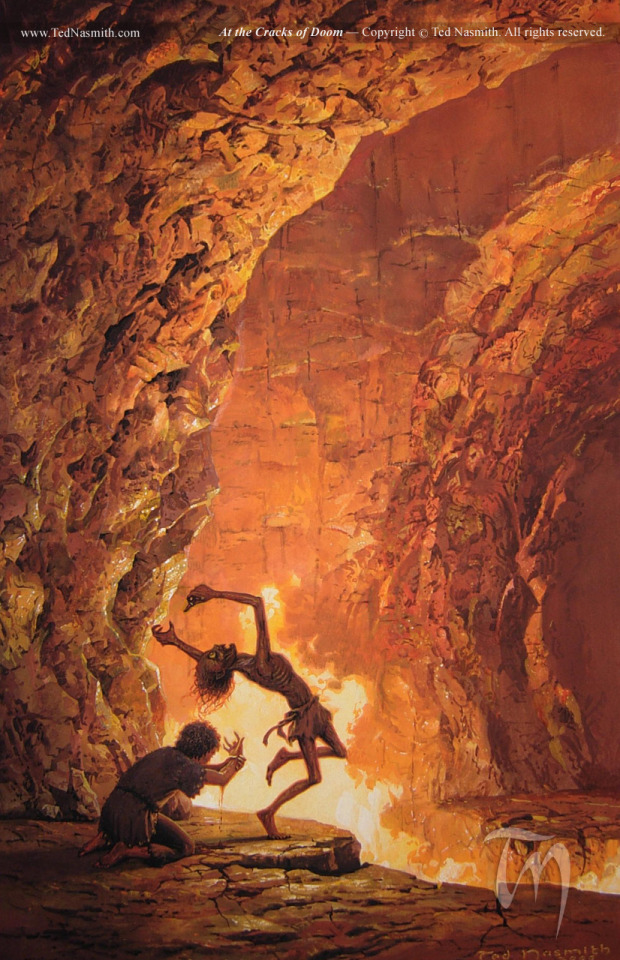
("At the Cracks of Doom" by Ted Nasmith)
Some thoughts on the following quote from the essay I posted in five parts the other day:
"[F]irstly [...] Tolkien places responsibility for the completion of the quest on Frodo’s choice to extend pity to Gollum, and secondly [...] he describes the action of the climactic scene in consistently passive ways."
I've sometimes wondered what would happen if we looked at The Legendarium through the lens of the things characters *didn't* do (and by "characters" I mean everyone I identify in the above essay as participants in the act of "con-creation" so basically any and everyone). One quick point: inaction is not the same as passivity, but it can describe the same things; inaction can also be understood to be an action; "not doing a certain thing" is not necessarily the same as "inaction"— with that said, just vibe with me here.
The essay includes two examples of inaction front and center: First, Frodo doesn't throw the Ring in the fire (just as he didn't in Bag End) and his wording is interesting (and has already garnered scholarly attention): "But I do not choose now to do what I came to do. I will not do this deed." Second, Eru doesn't trip Gollum. He also doesn't stop Melkor or Sauron or [insert here]. The entire Legendarium can (in my view) be understood as a thought experiment about why that is. Why instantiate a universe with discord baked into the design? (see the following for more on that: https://www.tumblr.com/phoenixrisesoncemore/730482234261405696/if-youve-followed-me-for-any-length-of-time-and).
Additionally, the Valar are eventually forced into inaction when it comes to confronting Melkor for fear of damaging the world. Something similar is said about both Manwe alone on the scale of Arda in later ages, and Galadriel on the scale of Middle-earth in the Third Age. Does inaction allow for more contemplation? For the joining together of more voices on a matter? Is it an outworking of estel? A refusal of assuming you can know the result of your own actions, thus enforcing the need for caution?
Add it to the list of future papers!
#tolkien#the lord of the rings#the silmarillion#tolkien metaphysics#inaction#passivity#Problem of Evil#theodicy#Why Eru Didn't Trip Gollum#Eru#Gollum#Frodo#Manwe#Galadriel#The Valar#Ainur
7 notes
·
View notes
Text
So the paradox passion of understanding continually bumps into this unknown that is there, but also unknown and therefore not there. Understanding doesn't reach further, but it still, in its paradoxy, cannot let go of trying to get there and occupying itself with it
- Kierkegaard, Philosophical Chunks, p. 42
2 notes
·
View notes
Text
Tell me about God suffering.
Tell me about the God who knew that we would break his heart, yet chose to create us anyway. Who saw Adam, fashioned in his own image, and said “It is very good.”
Tell me about the God who said, “my heart, my bowels, my inner parts weep like a lyre for the suffering of my people.” Who watched his loved ones worship idols and fall into sin, who knew all the blackest desires of their hearts. Who faithfully wounded them, sent them into exile, let them die, and said “How can I give you up, O Ephraim? My heart recoils within me.”
Tell me about a God who fashioned us from dust in the full knowledge that in order to keep us, he would see his son scourged and dying on the cross. Who knew that one day he would turn his face away. About a Jesus who said, “here am I, send me.” Who set his face towards Golgotha even in the halls of eternity.
Tell me about a God who became small and frail. Who endured headaches and hangnails and long nights without sleep. Who was anxious and afraid, embarrassed and misunderstood. Who was tempted. Who saw his friends sad and sick and dying. Who wept with the sound of a horse before battle.
Tell me about Jesus weeping and sweating blood in Gethsemane. Tell me about the cross. Tell me about “my God, my God, why have you forsaken me” and the agony of unanswered prayer.
Tell me about the Father and the Spirit, cut off from the Son for the first time in history. The Son, begotten and abandoned. The Spirit, proceeding from nowhere. Tell me about the death of one you have loved from eternity.
Tell me about the Spirit, who intercedes for us before the Father in groans too deep for words. Who understands our deepest pains that well.
People say that to love at all is to suffer, but that isn’t true. God loved and was loved in perfect Trinity before he created us. To love what is fallen is to suffer.
Tell me about the God who chose suffering.
@citrussunrises
#apparently my sister's prof said that God doesn't suffer???#she texted me about it this morning looking for a hot take#i'll find out more about it when i see her this evening (!!!) but i felt compelled to rant a little sans context#we have a God who suffers#(this is all off the cuff so feel free to tweak if you want idk)#only Thou art holy#pontifications and creations#theodicy
864 notes
·
View notes
Quote
Sometimes it feels as if God has invited himself into my pain, when I had hoped to be invited into God’s healing. We want a God who heals our wounds, but it seems we have a God who heals our hearts. My expectation was that God would make the pain leave me—that if the pain were little birds nesting in my heart, God would know when it was time for them to go and he’d toss them out of me. But some of them never fly away.
Matt Bays, Finding God in the Ruins
60 notes
·
View notes
Text
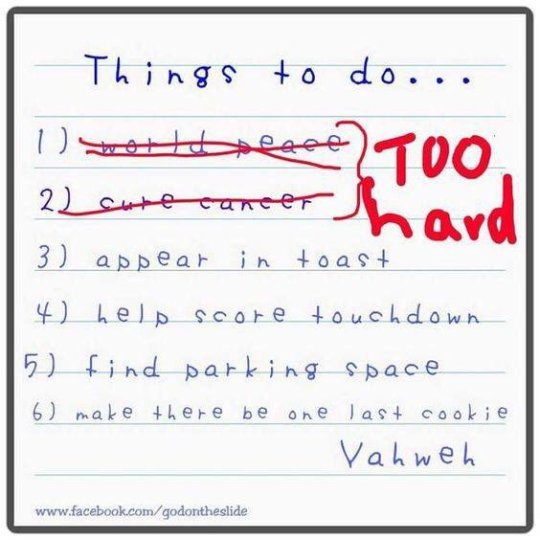
#problem of evil#theodicy#incompetent god#god of incompetence#concierge god#petty shit#god of the petty shit#religion#religion is a mental illness
46 notes
·
View notes
Photo

[id: an image labeled “the problem of evil: why does a good God let bad things happen?” A Popsicle stick triangle with duct tape shoddily holding it together has text in the center reading “pick 2,” the options being the three sides labeled “God is good & just,” “God is all powerful,” and “evil & suffering exist.” Text at the bottom of the image reads, “Let’s talk about it: Thursday May 5, 2022, 1pm EST live at Blessed Are the Binary Breakers on YouTube” / end ID]
Most, if not all, religions seek to answer the question of why suffering exists.
Let’s talk about it — this Thursday, May 5 2022, at 1pm EST at youtube.com/blessedarethebinarybreakers.
Without offering any definitive answers, I’ll take you through the responses of various biblical authors and theologians across the ages.
I’ll be tackling this topic from my own Christian context, but I welcome persons of any (or no) faith to join — the more perspectives present, the richer the discussion!
Some other things of note:
I’ll aim for this discussion to go about 1.5 hours. Coming late or leaving early is totally welcome.
Accessibility: I’ll have auto-captions on for the live-stream, and I’ll do my best to describe any images that I show. Let me know if there’s anything else I can do to make this event more accessible for you!
Participation: The nature of YouTube live is that I will be on video with sound and visuals (and I’ll be sharing a PowerPoint); while attendees are invited to participate with comments, or just listen in quietly. I will make lots of space for questions, ideas, and reactions!
Bigotry won’t be tolerated. Mistakes in wording happen of course, so don’t be afraid of making honest mistakes — but if it becomes clear a person is being intentionally bigoted in any way, including against non-Christians, I’ll kick them off.
#if you wanna tell me you plan on coming that's a big help to me!#also feel free to ask questions or share concerns#theodicy#bible study#youtube#youtube live#the problem of evil#suffering#log#spring 2022
133 notes
·
View notes
